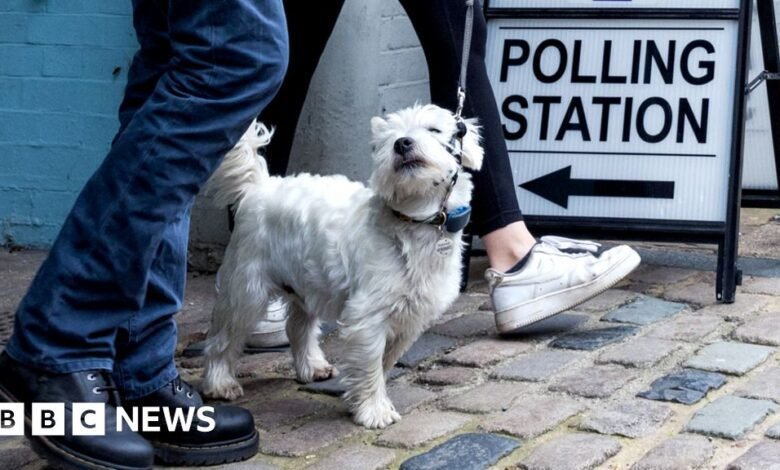Chris Mason: What this week’s local elections mean for national politics

- By Chris Mason
- Political Editor, BBC News
Wherever you live in England and Wales, you will be able to vote on Thursday.
Assuming, that is, you decide to use it and it’s on the electoral roll.
More than 2,660 council seats are up for grabs, with the Conservatives and Labor each arguing for a similar number – just under 1,000 each.
The Liberal Democrats support just over 400, the Green Party just over 100.
Will the Conservatives fare badly?
The widespread expectation, among conservatives and others, is: yes, they will.
Given that much is assumed, the big question is to what extent – and how is the result perceived by themselves?
The seats contested on Thursday were, for the most part, last contested in 2021.
At the time, the Conservatives under Boris Johnson were flying high, benefiting from a surge in popularity thanks to the Covid vaccination programme.
The elections coincided with a Westminster by-election in Hartlepool, which led to a Conservative gain over Labour, and Sir Keir Starmer’s lowest moment as Labor leader.
It was so bad for him that he considered resigning.
It means that this time the Conservatives have a long way to go, if that is the collective judgment of the electorate.
What is a good or bad outcome for the Conservatives and Labour?
These results are important in themselves.
They will be the decision makers over all aspects of daily life in their areas for years to come.
But they will also be used as a measure of the popularity or otherwise of the only two parties likely to lead a UK government – the Conservatives and Labour.
- Losing 315 seats, which would be about the same proportion as last year
- Losing 480, which would be equivalent to their worst-ever local election performance in 1995 – two years before they lost the general election by a landslide
- Losing 615, which would be a similar proportion to the Labor Party’s worst ever local election performance in 2009 – the year before they lost the general election.
Then there is what is called Projected National Participation.
This is an estimate of the percentage of votes that the main parties would have won if, across Britain, voters had behaved in the same way as those who voted in constituencies that were contested by the three main parties in this country. English local elections this year. Election experts Professor Sir John Curtice and Professor Stephen Fisher explain this in more detail here.
For context, last year Labor had a nine percentage point lead over the Conservatives. In 1995, its advantage was 21 percentage points; in 1996 it was 16 percentage points.
What about mayoral races?
Mayors are in fashion. They are often regional figures with a national profile.
And this time they are appearing in new places, such as the East Midlands and North Yorkshire.
Two contests stand out. They could prove to be the psychological seesaw upon which conservative sentiment towards all these races leans.
West Midlands and Tees Valley.
Both are currently in the hands of the Conservatives, but can they hold on?
Both the Conservatives and Labor are indulging in expectations management.
“Labour is throwing everything at this,” says a senior Conservative of the Tees Valley contest.
“Remember that they [the Conservatives] he won with more than 70% of the votes last time”, counters a Labor figure.
In the West Midlands, opinion polls suggest the situation is very close.
And here’s the psychological part: Losing Council
And the impact of these results on the mood of Conservative MPs in particular – who hold the short-term fate of Prime Minister Rishi Sunak in their hands – is important.
If the results are cataclysmic for them and they lose both these mayoral races and a number of council seats, will a critical mass of Conservative MPs be willing to oust the Prime Minister?
If, on the other hand, the party achieves an emblematic victory here or there, does this suppress anger and the desire for action?
Where else should we be careful?
There are contests for seats on 107 councils in England. This is much less than last year, when 230 local authorities held elections.
Here are a few places to keep an eye on, but they are not exhaustive.
How is the Labor Party performing in Hartlepool, Redditch, Milton Keynes and Hyndburn?
Do the Conservatives lose in Dorset, Nuneaton and Gloucester?
Can the Liberal Democrats win Wokingham, Dorset and Tunbridge Wells?
And can the Greens make gains in Bristol, Solihull and Stroud?
For a much more comprehensive read on all this, take a look at the Local Government Information Unit.
Senior Labor Party figures are confident of victory on the Lancashire coast.
They told me that they have data that clearly point in that direction.
It’s the kind of place Labor leader Sir Keir Starmer must win.
Reform UK’s performance in Blackpool is also worth noting.
Could they beat the Conservatives and come second?
The result will contribute greatly to the mood of the parties on Friday morning, in what will be a long weekend of results reaching across England and Wales.




